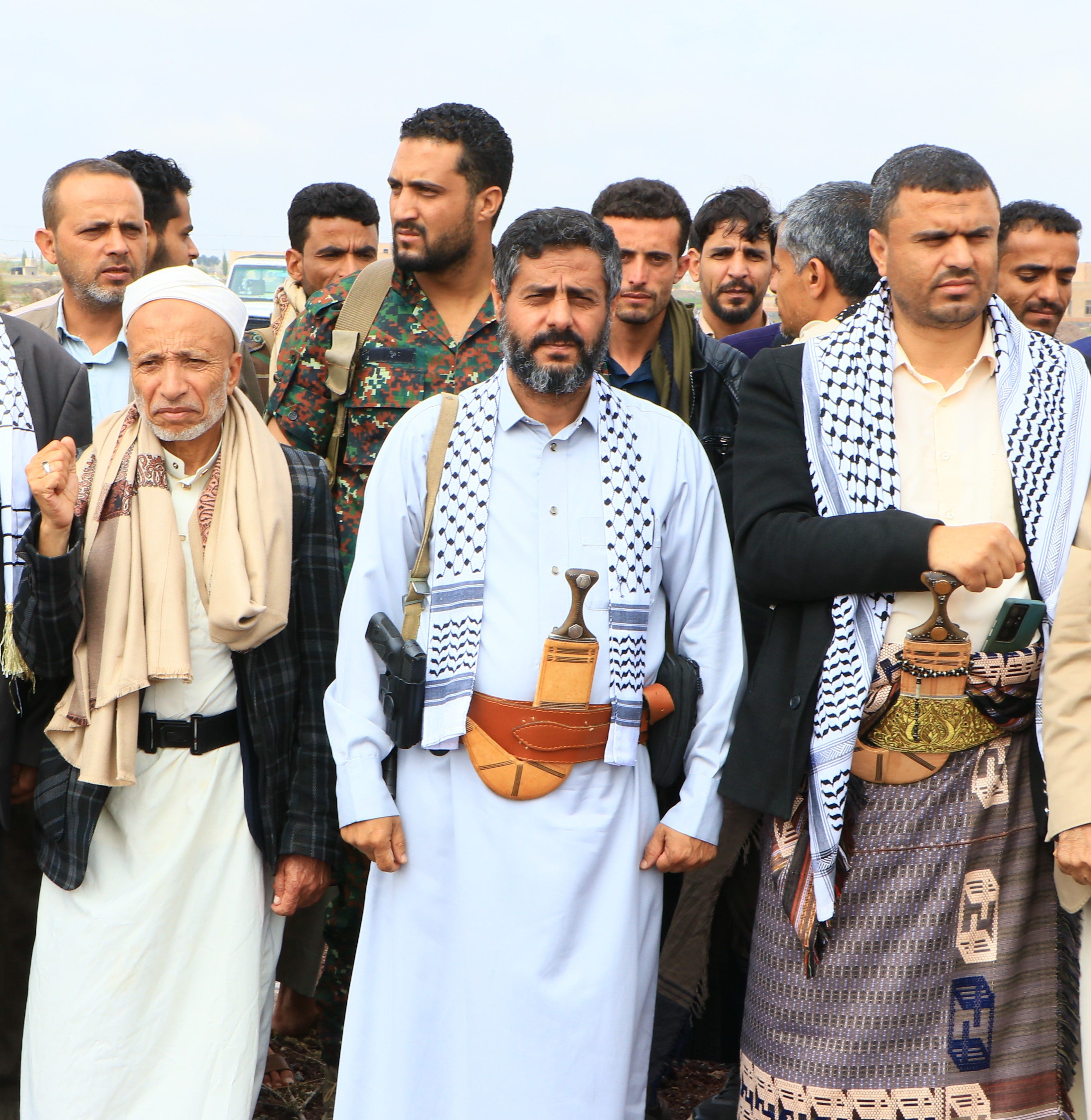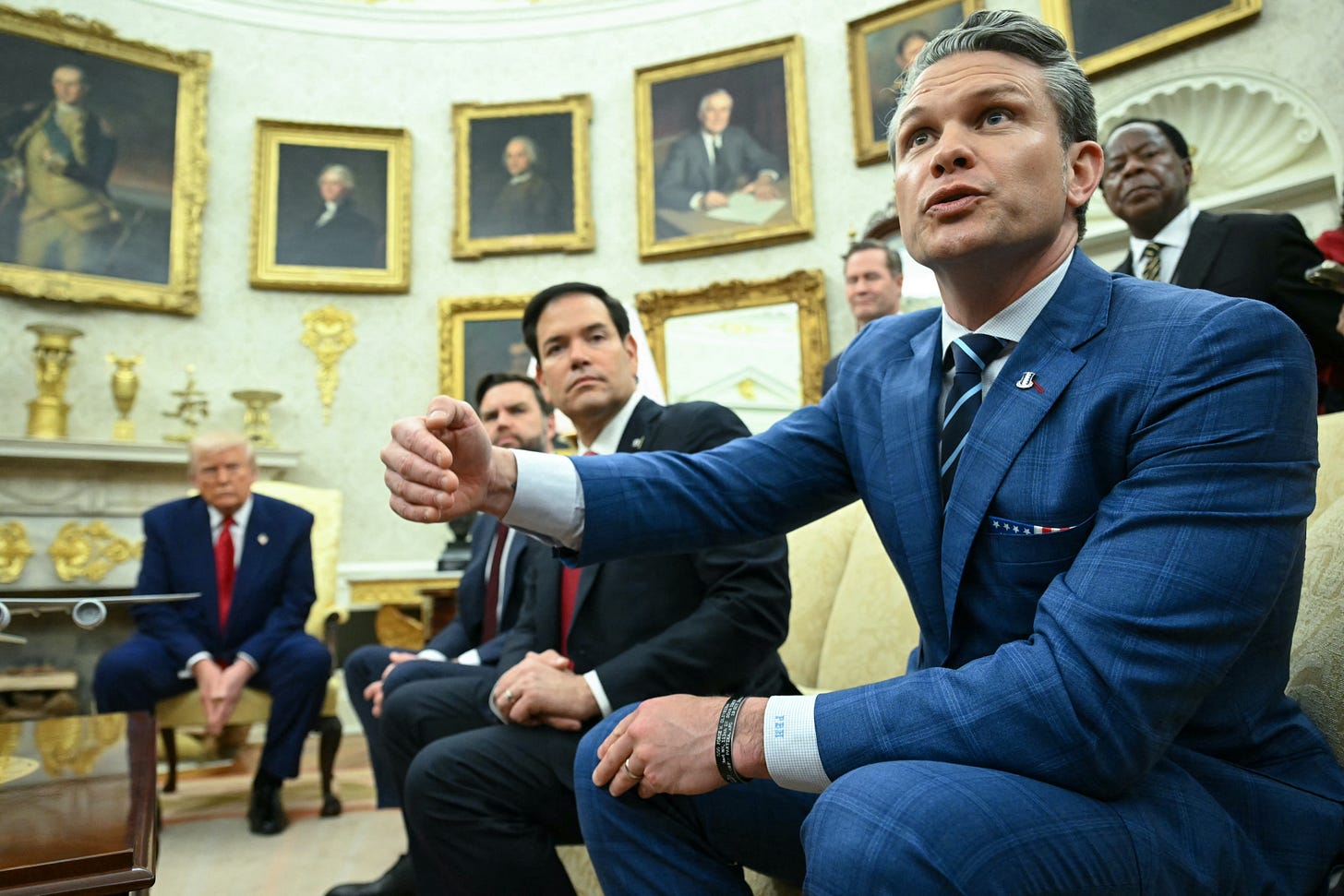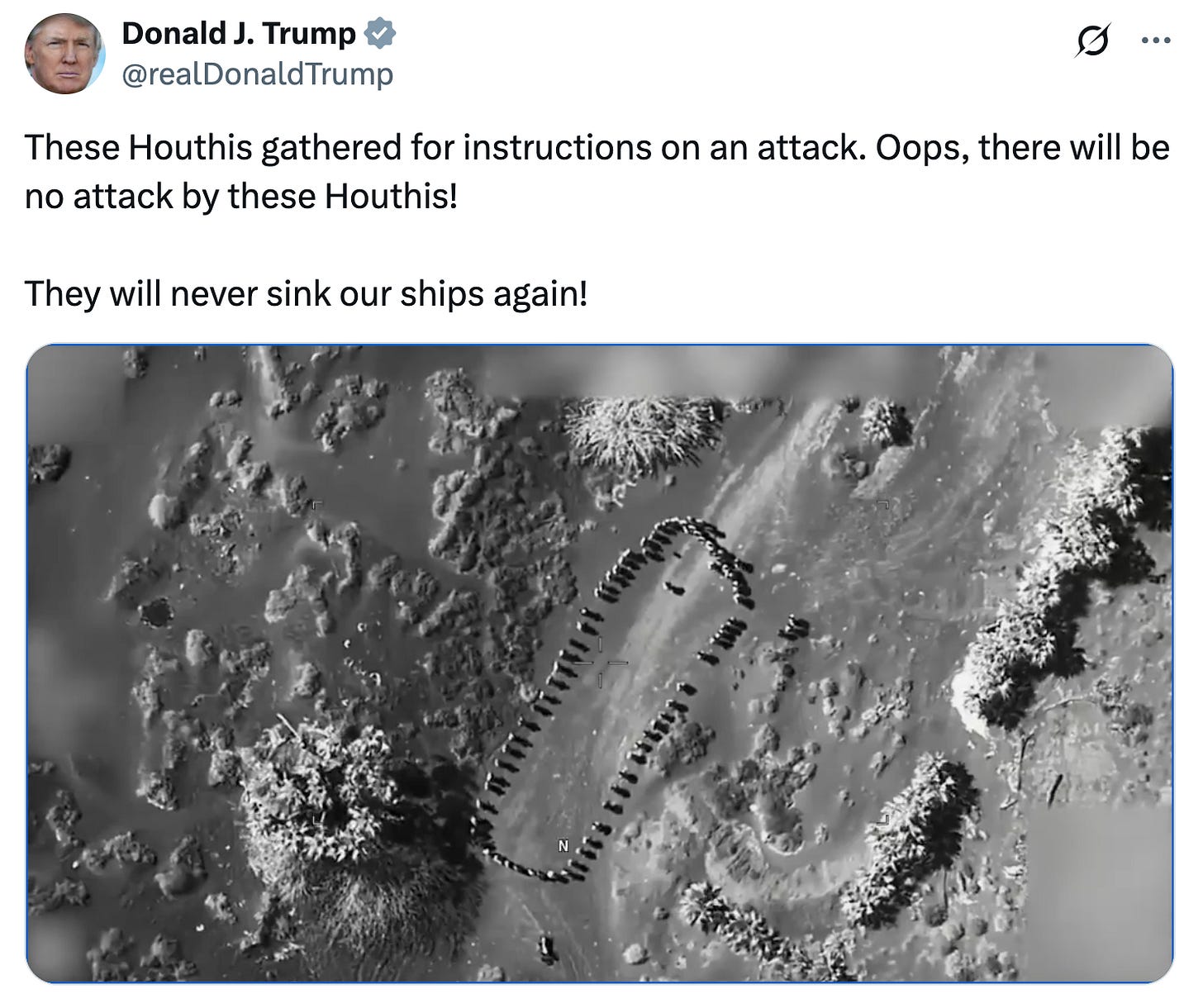Top Houthi Official Tells Drop Site Yemen Will Cease Attacks on U.S. Ships if Trump Halts Bombing
In a wide-ranging interview, Mohammed al-Bukhaiti said Trump can end the battle in the Red Sea by forcing Netanyahu to stop Israel’s genocidal war.

A senior leader of Ansar Allah, commonly known as the Houthis, told Drop Site News that if the U.S. ends its campaign of air strikes against Yemen, Houthi forces will commit to halting all attacks on U.S. ships in the region. “We do not consider ourselves at war with the American people,” said Mohammed al-Bukhaiti, a member of Ansar Allah’s political bureau and a longtime spokesperson for the Houthis. “If the U.S. stops targeting Yemen, we will cease our military operations against it.”
Since November 2023, in response to Israel’s war on Gaza, the Houthis have maintained a formidable naval blockade on the Red Sea, preventing commercial ships from traveling to Israel. The Houthis have also launched military attacks on Tel Aviv and other Israeli cities throughout the course of the war, saying their naval and military operations would continue in solidarity with the Palestinian resistance.
On March 15, President Donald Trump ordered a sustained bombing campaign against Yemen, ostensibly in the name of protecting international shipping lanes in the waters off the coast of Yemen—bombing the country almost every night. Dozens of civilians have been killed. “The choice for the Houthis is clear: Stop shooting at U.S. ships, and we will stop shooting at you,” Trump wrote in a post on TruthSocial on March 31. “Otherwise, we have only just begun, and the real pain is yet to come.”
Trump’s admonition was echoed by Defense Secretary Pete Hegseth in an interview with Fox News: “The minute the Houthis say, 'We'll stop shooting at your ships, we'll stop shooting at your drones,' this campaign will end. But until then, it will be unrelenting.”
While Houthi forces have attacked U.S. military warships and drones positioned in the region to conduct strikes against Yemen, they have not targeted any U.S. commercial vessels since Trump took office. Since the U.S. has escalated its attacks on Yemen, Ansar Allah has remained committed to military operations it characterizes as self-defense and acts of solidarity with the Palestinians of Gaza. “Our war with the U.S. is not inevitable,” al-Bukhaiti argued. “If the U.S. ends its hostile policies against us and our Islamic nation, we will stop our hostile actions against it. So, the ball is in the court of the ruling establishment of Washington.”
In an exclusive interview with Drop Site, the most substantive one given to a U.S. outlet since the heavy U.S. strikes began last month, al-Bukhaiti defended the Houthi blockade on the Red Sea. The governor of Dhamar Governorate, which has been bombed in the recent U.S. military attacks, al-Bukhaiti outlined the Houthis' conditions for military de-escalation.
“When the Zionist entity stops its genocidal crimes in Gaza and allows food, medicine, and fuel to enter, in accordance with the ceasefire agreement, we will cease all military operations against it,” al-Bukhaiti said. “We only defended ourselves. There are also crimes of genocide in Gaza and a siege aimed at starvation. All nations should act to support the oppressed and the weak, as emphasized by international conventions and international human rights law.”
Al-Bukhaiti said that, while the Houthis would respect an agreement covering U.S. ships if the American bombing ends, Israeli ships would still be subjected to the blockade until Israel ends its genocidal war against the Palestinians of Gaza—or in the event of a renewed ceasefire agreement. “Operations against the Zionist entity will continue until our objectives are achieved,” al-Bukhaiti said. “If Trump truly seeks peace, as he claims, his efforts should have been directed at pressuring Netanyahu to implement the ceasefire agreement, which includes lifting the siege on Gaza and allowing food and medicine to enter. Only then will we stop all military operations against the Zionist entity.”
While the Trump administration has characterized the Houthi attacks as being against American commercial shipping vessels, the reality is that the attacks against the U.S. have been aimed at warships and drones participating in the strikes on Yemen. They have attacked US destroyers with cruise missiles, drones, and anti-ship missiles. On Wednesday, the Houthi’s military spokesman Yahya Saree said the group shot down a US MQ-9 drone that was “carrying out hostile missions” in northeastern Yemen. He said the drone was hit by “a domestically made surface-to-air missile.” Saree claimed it was the third U.S. drone downed in the past ten days and the 18th since the Houthis launched the solidarity front with Gaza.
The last known Houthi attack on U.S. commercial ships occurred in December 2024, prior to Trump taking office. American warships escorted three U.S.-flagged vessels en route to the East African nation of Djibouti when Houthi forces launched a barrage of attacks against the ships. No such attacks have taken place since Trump was sworn in.
“That no [U.S.] vessels have been targeted since [December 2024] confirms the effectiveness of our operations in support of our brothers in Gaza, and confirms that we only target ships belonging to the Zionist entity or those dealing with it,” said al-Bukhaiti. “We learned from the U.S. how to use naval blockades as a weapon—but we use them for ethical reasons. The U.S. and Zionist entity have imposed sea, land, and air blockades on Gaza. Therefore, our blockade enforced on the Zionist entity is a reaction to the blockade on Gaza.”
In a speech on Thursday, Abdulmalik Al-Houthi, the leader of Ansar Allah, said the U.S. airstrikes on Yemen have failed to halt the Red Sea blockade or deter Houthi strikes on Israel. “The Americans have not been able to secure maritime navigation for the Israeli enemy,” he declared. “Nor have they been able to stop the missile attacks and drones into occupied Palestine, and they will not be able to do so, God willing.”
Since initiating the naval blockade at the start of the Gaza war, Houthi forces have targeted dozens of international ships en route to Israel with drone and missile strikes and even commandeered one vessel. While the U.S. has characterized the Houthi attacks as an imminent danger to American lives, the attacks of the past fourteen months have resulted in the deaths of a total of three merchant sailors, two Filipino nationals and one Vietnamese citizen. Much of the damage wrought by the Houthi naval blockade has been economic, dramatically reducing the volume of merchant traffic in the region, especially at the Israeli port of Eilat, which is reliant on Red Sea shipping. The waves of retaliatory bombings by the U.S., U.K., and Israel have done little to deter the Houthis’ maritime operations.
While Trump and other senior U.S. officials have claimed they would cease attacks on Yemen if the Houthis stop firing on American ships—which is precisely what al-Bukhaiti told Drop Site the Houthis are prepared to do—it is unlikely they would make good on that pledge as long as Israel’s war against the Palestinians of Gaza continues.
In an Executive Order, signed on January 22, Trump declared, “It is the policy of the United States to cooperate with its regional partners to eliminate Ansar Allah's capabilities and operations, deprive it of resources, and thereby end its attacks on U.S. personnel and civilians, U.S. partners, and maritime shipping in the Red Sea.” That order also restored the Houthis designation as a Foreign Terrorist Organization, an action Trump also took during his first presidential term that was later reversed by President Joe Biden.
“American interests, whether military or economic, continue to be driven by the continuation of the war in Yemen and the region—to sell weapons and maintain Israel’s qualitative edge,” al-Bukhaiti said. “Therefore, America is not acting as a mediator to achieve peace, but rather to increase the differences and deepen the divisions among countries of the region.”
The Houthis have said that any decision to lift the naval blockade would be guided by the actions of Hamas and other Palestinian resistance factions in Gaza. “When the Zionist entity stops its genocidal crimes in Gaza and allows food, medicine, and fuel to enter, in accordance with the ceasefire agreement, we will cease all military operations against it,” al-Bukhaiti said. And there is good reason to believe him.
When Hamas signed a ceasefire deal with Israel on January 17, the Houthis announced they were lifting their blockade and ceased their attacks. The first phase of the Gaza deal expired on March 1 and Israel refused to continue negotiating the second phase. Instead, it imposed a sweeping blockade on Gaza, preventing all aid from entering the Strip. The Houthis issued an ultimatum to Israel to lift the siege on Gaza and gave it four days to comply. On the fifth day, the Houthi naval blockade was reimposed.
“Regarding the Gaza issue, the Americans should negotiate with the Palestinian resistance in Gaza to reach a solution, as our military operations are meant to exert pressure and serve as leverage in the hands of Palestinian negotiators,” al-Bukhaiti said. “We must take action to stop the crimes of genocide by all means—even militarily and economically. Accountability should target those supporting genocide in Gaza, protecting its perpetrators and neglecting their duty, not those fulfilling their religious, moral and humanitarian duties.”
Drums of War Against Iran
The Trump administration has portrayed the Houthis as proxies of Iran and has alleged that Tehran is actively arming and facilitating the Yemeni blockade and attacks on Israel. Before launching the March 15 attacks, Trump posted a message he said was aimed at Iran: “Do NOT threaten the American People, their President, who has received one of the largest mandates in Presidential History, or Worldwide shipping lanes. If you do, BEWARE, because America will hold you fully accountable and, we won’t be nice about it!”
Gen. Hossein Salami, head of Iran’s Revolutionary Guard Corps, denied Iran was dictating the Houthis’ operations, saying Tehran “plays no role in setting the national or operational policies” of its allies in the Axis of Resistance.
Drop Site asked al-Bukhaiti about the U.S. allegations and the extent of Iranian military support for Houthi forces. “Yemen is under a blockade that prevents any weapons from entering, so we had to depend on ourselves to manufacture all our weapons—missiles, drones, and other military equipment,” al-Bukhaiti asserted. “Yemen is continuously developing its defensive capabilities, which is one of the few benefits of the imposed blockade.” He added, “Islamic action to aid our brothers in Gaza is a religious, moral, humanitarian and fraternal duty—not pro-Iranian. Iran’s stance is moral and commendable, as it stands with the freedom and rights of the oppressed.”

On Monday, during an Oval Office meeting with Israeli Prime Minister Benjamin Netanyahu, Trump veered away from a discussion about the state of the Gaza war and addressed the situation in Yemen. Trump seemed to have only recently learned that the Houthis manufacture their own weapons and appeared to confirm al-Bukhaiti’s claims of major domestic weapons production. “They’re experts on missiles. I mean they actually make missiles, nobody thought that, but they make missiles. It’s highly sophisticated, and they’re very tough,” Trump said.
Trump then turned to his defense secretary Hegseth, sitting at the far end of the couch, and asked him to weigh in.
“Yes, sir,” Hegseth said. “It’s been a bad three weeks for the Houthis, and it’s about to get worse. It’s been a devastating campaign, whether it’s underground facilities, weapons manufacturing, bunkers, troops in the open, air defense assets. We are not going to relent. And it’s only to get more unrelenting until the Houthis declare they will stop shooting at our ships.”
Al-Bukhaiti acknowledged that the U.S. bombing campaign has caused widespread destruction in Yemen, but he added that the Houthis understood the stakes involved with confronting Israel. “We knew from the beginning that supporting Gaza would bring heavy losses, as we would be entering into a confrontation with the Zionist entity and its allies, especially the U.S. However, we have also inflicted significant economic and military losses on America and the Zionist entity,” he said. “This battle is not only a battle of arms—it is also a battle of ethics. Yemen has already won the battle of ethics from the first round. The world now sees that America is not sincere in its claims about protecting human rights, freedom and dignity—nor its claim to be keen to spread democracy, as it supports genocide in Palestine.”
Al-Bukhaiti said the Houthis have “dented America’s image,” by forcing the U.S. and other Israeli allies to use complex detours for shipping, including traversing the southern African coast to reach Europe. He also said that U.S. warships have been forced to retreat to positions hundreds of miles off the Yemeni coast. “This made them unable to carry out attacks without mid-air refuelling of fighter jets, which limited their effectiveness,” he said. “So while we are suffering losses, we are also inflicting them. For us, this is a moral battle we must fight—no matter the cost. Silence in the face of genocide would mean the end of morality, humanity, and loyalty. Yemen’s position should be an honor to all the free people of the world.”
Trump and Hegseth have celebrated their strikes against the poorest country in the Arab world with a mixture of pomposity and self-praise, often characterizing their actions as unique. The fact is that the U.S. has consistently bombed Yemen since December 2009, when President Barack Obama initiated a secret air war in the name of fighting Al Qaeda in the Arabian Peninsula. This soon evolved into a sustained bombing campaign, beginning in 2015, facilitated by the U.S. and Britain in a coalition officially led by Saudi Arabia.
In response to the Houthi attacks against Israel and its naval blockade, in January 2024, President Biden authorized the U.S. to begin striking Yemen alongside the U.K's own attacks. These strikes were largely focused on Houthi launch sites used to attack ships, target industrial areas and electrical infrastructure, and disrupt shipping ports.
The Trump administration has dramatically expanded these attacks, directly targeting Houthi officials for assassination while bombing crowded Yemeni cities. At least 115 Yemeni civilians have been killed since March 15, according to the Yemeni Health Ministry. On Tuesday, U.S. strikes in Hodeidah killed fifteen people, most of them children and women, according to the ministry spokesperson. On Wednesday night in Sana’a, three were killed. The Houthis have not released statistics on deaths among their forces.
Under both Biden and Trump, the U.S. has also tried to destroy facilities for weapons production in Yemen, though experts and U.S. officials have consistently acknowledged that such strikes have not degraded the Houthis’ capabilities or halted their maritime operations. The Houthis are believed to have a substantial weapons arsenal protected by Yemen’s mountain ranges and stored deep underground. For years, U.S. intelligence analysts have struggled to locate the sites or devise ways to eliminate them.
In his speech Thursday, Ansar Allah’s leader said the U.S. strikes had only encouraged the Houthis to produce more weapons. “They will not weaken our military capabilities, but rather contribute to their further development,” said Abdulmalik Al-Houthi. “They will not weaken the military situation in this country, because it is a solid position based on faith-based foundations and roots.”
The bombing campaign in Yemen, carried out by the Trump administration, has cost the U.S. over $1 billion, across munitions and operational and personnel expenses, despite limited military successes. According to retired Navy Commander Bryan Clark of the Hudson Institute, the U.S. Navy has used more missiles for "air defense" against the Houthi naval blockade than the service had deployed in total from Operation Desert Storm in the 1990s to October 2023, when the military operation in the Red Sea began.
Lethal Signals
On the morning of March 15, shortly before the U.S. began its massive airstrikes on Yemen, National Security Advisor Mike Waltz set up a group chat on the encrypted messaging app Signal. Called “Houthi PC small group,” Waltz said he had established it as “a principles group on Houthis, particularly for over the next 72 hours.” Its members included Hegseth, Vice President JD Vance, Secretary of State Marco Rubio, CIA Director John Ratcliffe and other national security officials.
Its contents became public, because The Atlantic’s Editor-in-Chief Jeffrey Goldberg was “inadvertently” added to the group. “The world found out shortly before 2 p.m. eastern time on March 15 that the United States was bombing Houthi targets across Yemen,” Goldberg wrote. “I, however, knew two hours before the first bombs exploded that the attack might be coming.”
The chats depicted a sophomoric group of officials boasting of how they were going to attack Yemen, including by bombing an alleged Houthi official soon after he entered a residential apartment building. “The first target – their top missile guy – we had positive ID of him walking into his girlfriend’s building and it’s now collapsed,” Waltz wrote. “Excellent,” replied Vance. Waltz then sent emojis of a U.S. flag and fire. “Great job all,” wrote Secretary of Defense Pete Hegseth. “Kudos to all — most particularly those in theater and CENTCOM! Really Great. God bless,” remarked White House Chief of Staff Susie Wiles. Tulsi Gabbard, the director of national intelligence, replied, “Great work and effects!”
According to Yemeni health officials, fifty-three people were killed, including five children. More than a hundred others were injured.
Most of the media coverage and criticism of the Trump administration focused on the use of Signal and Goldberg’s inclusion in U.S. intelligence discussions, rather than the contents of the military executions. The most senior security officials in the U.S. discussed bombings as though they were sporting events. Of the U.S. officials in the chat, only Vance expressed some initial concerns about launching the attacks on Yemen, but his objections centered around economic and public messaging issues.
“I think we are making a mistake,” Vance wrote. “3 percent of US trade runs through the suez. 40 percent of European trade does. There is a real risk that the public doesn’t understand this or why it’s necessary. The strongest reason to do this is, as POTUS said, to send a message,” he added. “I am not sure the president is aware how inconsistent this is with his message on Europe right now. There’s a further risk that we see a moderate to severe spike in oil prices.”
Ultimately, Vance said he would be “willing to support the consensus of the team and keep these concerns to myself. But there is a strong argument for delaying this a month, doing the messaging work on why this matters, seeing where the economy is, etc.”
CIA Director Ratliffe supported Vance, writing, “[W]e are mobilizing assets to support now but a delay would not negatively impact us and additional time would be used to identify better starting points for coverage on Houthi leadership.”
Hegseth advocated for attacking immediately. “I think messaging is going to be tough no matter what – nobody knows who the Houthis are – which is why we would need to stay focused on: 1) Biden failed & 2) Iran funded,” he wrote. “We are prepared to execute, and if I had final go or no go vote, I believe we should. This [is] not about the Houthis. I see it as two things: 1) Restoring Freedom of Navigation, a core national interest; and 2) Reestablish deterrence, which Biden cratered.”
After some back and forth about how the U.S. would be doing the world a favor by striking Yemen, Vance messaged Hegseth. “[I]f you think we should do it let’s go. I just hate bailing Europe out again,” he wrote.
Congressional Democrats railed against the use of Signal by Trump’s national security team, demanding investigations into the unauthorized disclosure of the attack plans to Goldberg. There were almost no concerns raised publicly about the contents of the chat—what they revealed about the ethics of expanding U.S. bombing in Yemen and the civilian deaths it would inevitably bring.
“The Americans focused on the danger of such leaks. But they revealed the arrogance of U.S. officials in Trump’s administration—not just toward Yemen or Palestinians, but even their closest allies,” al-Bukhaiti said. “The leaks exposed the real aim of U.S. military operations: blackmailing allies in the region, Europe, Japan, and others.”
On April 4, Trump posted a video on social media, one that would have been a scandalous revelation brought to light by Wikileaks not long ago. The video depicted a U.S. missile raining down on a tribal gathering in the hinterlands of Yemen. “These Houthis gathered for instructions on an attack. Oops, there will be no attack by these Houthis! They will never sink our ships again!” declared Trump. The attack reportedly killed more than seventy people. U.S. Central Command, which oversees the strikes against Yemen, did not publish the video, nor has it offered any details about the strike.

“What was targeted was a social gathering—such gatherings happen during holiday visits or tribal meetings to resolve issues. It was not a meeting to plan attacks on the U.S. Navy as Trump claimed,” said al-Bukhaiti. “Such strikes expand the scope of conflict. Targeting these social or cultural events is a dangerous development. Everyone should know that America was the first to do so.” The official Saba News Agency reported, “Those present at that gathering had no connection to the operations carried out by Ansar Allah,” but did not identify who was killed. Bukhaiti claimed no Houthi leaders were present, but he declined to elaborate. Asked why the Houthis did not acknowledge the U.S. attack until Trump posted the video footage days later, al-Bukhaiti said, “That was due to certain considerations, including maintaining internal unity. But this does not justify America targeting such gatherings.”
Al-Bukhaiti said that the Houthis are prepared to maintain their stance in support of Gaza as long as necessary, despite the constant stream of bombs and threats emanating from the White House. “The tragedy in Palestine is due to both the complicity of many countries, led by the U.S., and regional silence from Arab and Islamic countries. We cannot be conspirators or bystanders,” he said. “We must take action to stop the crimes of genocide by all means—even militarily and economically. Accountability should target those supporting genocide in Gaza, protecting its perpetrators and neglecting their duty, not those fulfilling their religious, moral and humanitarian duties.”
Jawa Al Muzaiel contributed to this report.







The poorest nation is showing the world what courage and morality looks like. On 'Useful Idiots' Substack, find Jewish-American Katie Halper's interview of Irish politicians Clare Daly and Mick Wallace who visited Yemen recently for a Palestinian solidarity conference. It's amazing. Trump's threat for a ground offensive will end badly. Will the blind arrogance of the Empire never end?
Thank you Yemen 🙏❤️🇾🇪🇵🇸